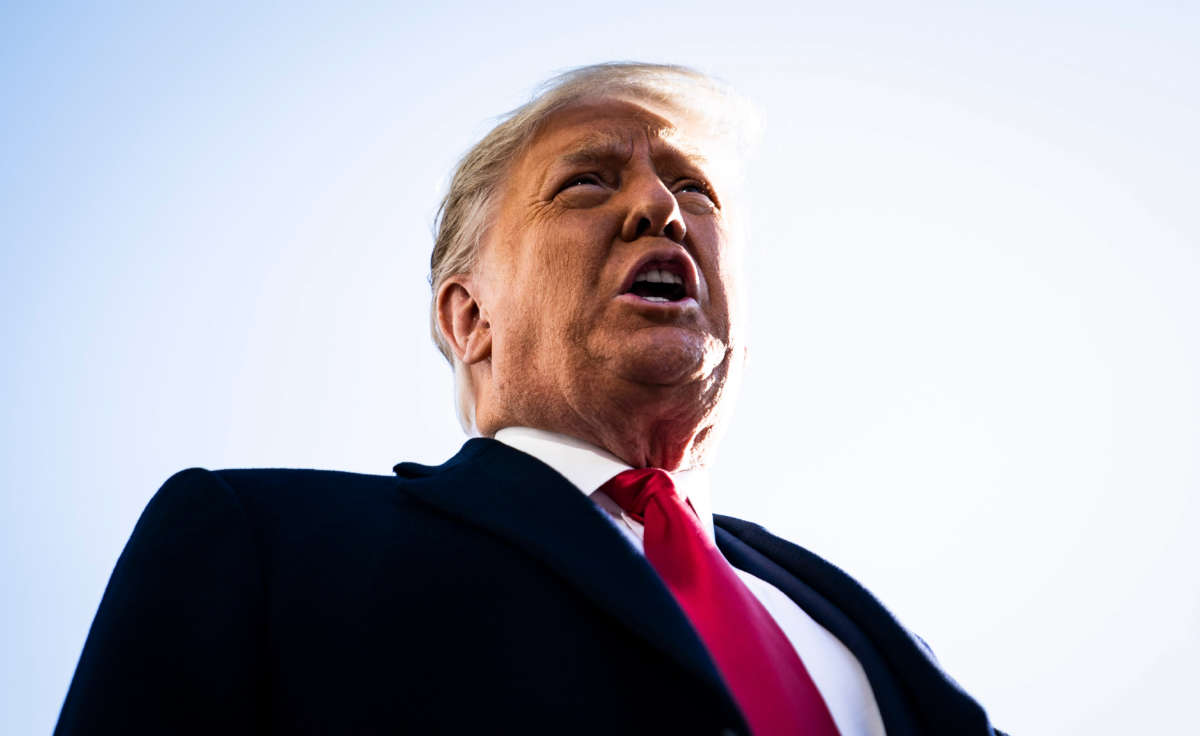Did you know that Truthout is a nonprofit and independently funded by readers like you? If you value what we do, please support our work with a donation.
Donald Trump’s lawyers said that the former president will not testify in his impeachment trial next Tuesday.
Rep. Jamie Raskin (D-Maryland), the lead House impeachment manager, had sent a letter to Trump Thursday asking the former president to provide testimony, either in person at the trial or at a separate location, between February 8 and 11.
Trump’s lawyers, Bruce Castor and David Schoen, responded to Raskin’s request later that day.
“Your letter only confirms what is known to everyone: you cannot prove your allegations against the 45th President of the United States, who is now a private citizen.”
Trump spokesman Jason Miller also responded to the request from Raskin. While the former president’s lawyers didn’t directly state that Trump wouldn’t be a witness in his own trial, Miller was much more direct.
“The President will not testify in an unconstitutional proceeding,” Miller said.
Raskin’s letter noted how Trump’s lawyers filed a legal brief two days ago for the impeachment trial that contradicted a number of “factual allegations” that were laid out in the single article of impeachment made against him for inciting a mob of his own supporters last month to descend upon the Capitol, where they forcibly breached the building.
“You have thus attempted to put critical facts at issue notwithstanding the clear and overwhelming evidence of your constitutional offense,” Raskin wrote. “In light of your disputing these factual allegations, I write to invite you to provide testimony under oath, either before or during the Senate impeachment trial, concerning your conduct on January 6, 2021.”
The request from Raskin was not binding. However, should Trump decline the request, Raskin wrote in the letter, it would give him and other impeachment managers the right to suggest in the trial that his refusal “supports a strong adverse inference regarding [Trump’s] actions.”
The comments from his lawyers and from his spokesman match arguments made earlier this week by Trump’s legal team — that the impeachment trial he was set to face was improper.
“As you certainly know, there is no such thing as a negative interference in this unconstitutional proceeding,” they wrote.
Trump’s legal brief, submitted on Tuesday, stated that he could not be indicted in a Senate impeachment trial because the “Senate lacks jurisdiction” to try a former president — an argument rejected by several legal experts. Trump’s legal team also argued that Trump wasn’t responsible for inciting his supporters to attack the Capitol because he is protected by his First Amendment constitutional rights “to express his belief that the election results were suspect.”
“Insufficient evidence exists upon which a reasonable jurist could conclude that the 45th president’s statements were accurate or not, and he therefore denies they were false,” his lawyers claimed.
There is no evidence to substantiate claims that the 2020 presidential election was fraudulent.
House impeachment managers soundly rejected Trump’s claim that his First Amendment rights warranted him the ability to speak without consequence. “Rights of speech and political participation mean little if the President can provoke lawless action if he loses at the polls,” they wrote in their filing on Tuesday. “The 1st Amendment does not constrain Congress from removing an official whose expression makes him unfit to hold or ever again occupy federal office.”
Trump’s impeachment trial is set to begin next week. For Trump to be indicted, it will require a two-thirds vote of the Senate. If every member of the Democratic caucus finds him guilty, at least 17 Republicans will have to join them in order to disbar Trump from holding office again.
The public is currently split on the issue of whether the Senate should indict Trump, with slightly more people preferring a guilty verdict for Trump. A Quinnipiac University poll released this week found that 50 percent of Americans want Trump to be convicted, while 45 percent say they hope that he isn’t.
Holding Trump accountable for his illegal war on Iran
The devastating American and Israeli attacks have killed hundreds of Iranians, and the death toll continues to rise.
As independent media, what we do next matters a lot. It’s up to us to report the truth, demand accountability, and reckon with the consequences of U.S. militarism at this cataclysmic historical moment.
Trump may be an authoritarian, but he is not entirely invulnerable, nor are the elected officials who have given him pass after pass. We cannot let him believe for a second longer that he can get away with something this wildly illegal or recklessly dangerous without accountability.
We ask for your support as we carry out our media resistance to unchecked militarism. Please make a tax-deductible one-time or monthly donation to Truthout.
